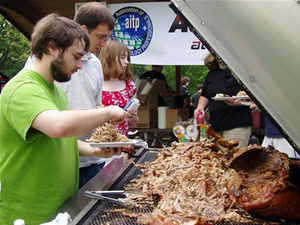The time has finally arrived for you to buy yourself the BBQ of your dreams. It’s wonderful to have a full-sized BBQ to create great summer memories with. Along with all of the bells and whistles that now come on most modern BBQ units, they will usually come with a hard metal cover. Many times you have to buy a material cover separately. Both of these covers are great for protecting your new treasure from Mother Nature. However, each type of cover requires regular maintenance if you want to ensure their longevity.
Basic Wear and Tear
As time passes, you will find that your BBQ covers will need to be cleaned. In the beginning, you may not notice any build-up. But if your unit is left outside, especially over winter, you will start to notice the grit and grime. You can easily reduce this problem by regular cleaning. Just begin by routinely wiping down both the hard metal and cloth covers of your BBQ. Keep in mind that your unit is continuously exposed to the sun, wind, rain, and cold. All of these elements have the power to do serious damage to roofs and walls of houses. Just imagine the toll they can take on mere cloth and metal.
Smoke and Such
Your metal cover will require regular scrubbing, inside and out, due to the soot and carbon generated by the cooking process. You will notice this residue under the BBQ’s metal cover and it will appear as an oily, black, ashy film. It is a byproduct of the smoke that is created while you’re cooking. If you don’t see to this soot, it will lead to your BBQ cooking at uneven temperatures. As if that’s not bad enough, some of this residue will eventually rain down on your next grilling masterpiece causing unwanted additions to your meal.
Creatures, Insects and Mold-Oh my!
Don’t think for a minute that your BBQ is ready for winter storage just because you have placed its handy-dandy cover on it. Bits of food, grease, and carbon can create quite a feast for insects and small rodents that can squeeze into your BBQ. On many occasions, a BBQ owner has been startled upon trying to have a mid-winter BBQ for a football game, only to find a family of mice living at the bottom of their unit with a million ants joining in on consuming the grease drippings.
And then there is the mold to think about. The winter cold creates condensation on the metal of the unit. Combine that with the cloth cover which blocks out the sunlight. Throw in some bits of old food and grease droppings and you have a perfect petri dish in which to incubate mold.
Rust
Most of your BBQ, to include your cover, is mainly comprised of steel. Unfortunately, steel is prone to rusting whenever its protective coating loses its seal by getting scratched, cracked, or otherwise broken. If you couple that situation with the condensation of winter, oxidation can set in and do some serious damage to the cover of your BBQ. Once this toll has been taken on your unit, you probably won’t have a lot of interest in barbequing next summer on the rusty heap that it has become. All it takes to fend off this scenario is an ounce of prevention in the form of oil. Simply spray a small amount of oil inside the BBQ, on the hinges, and all over the grill itself to stave off the destruction of rust.
There are a plethora of cleaning products on the market that can easily cut through grease and carbon build-up. But many of these chemicals can be very harsh and are solely designed to be used on non-porous, hard surfaces, unlike cloth BBQ covers. Some of these abrasive chemicals may also harm the protective coatings on your metal BBQ cover. Just do yourself a favor and talk with the experts at your local BBQ supplier to verify which products are safe to use on your particular unit.
In Closing
If maintained and treated properly, both your metal and cloth BBQ covers can last you for several years or breakdown rather quickly due to neglect. The destructive combination of the elements, carbon, grease, and leftover food can reap havoc on your unit if you do not intervene. Save yourself the cost and hassle of having to buy new BBQ covers on a yearly basis by taking the time to regularly clean and maintain your unit.
Sources:
Weber BBQ
The Natural Handyman Guide to BBQ Maintenance
